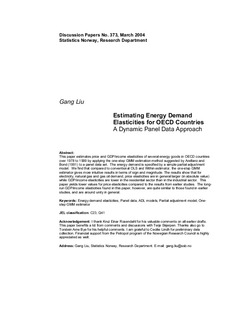| dc.contributor.author | Liu, Gang | |
| dc.date.accessioned | 2011-11-23T19:29:35Z | |
| dc.date.available | 2011-11-23T19:29:35Z | |
| dc.date.issued | 2004 | |
| dc.identifier.issn | 1892-753x | |
| dc.identifier.uri | http://hdl.handle.net/11250/180417 | |
| dc.description.abstract | Abstract:
This paper estimates price and GDP/income elasticities of several energy goods in OECD countries
over 1978 to 1999 by applying the one-step GMM estimation method suggested by Arellano and
Bond (1991) to a panel data set. The energy demand is specified by a simple partial adjustment
model. We find that compared to conventional OLS and Within estimator, the one-step GMM
estimator gives more intuitive results in terms of sign and magnitude. The results show that for
electricity, natural gas and gas oil demand, price elasticities are in general larger (in absolute value)
while GDP/income elasticities are lower in the residential sector than in the industrial sector. This
paper yields lower values for price elasticities compared to the results from earlier studies. The longrun
GDP/income elasticities found in this paper, however, are quite similar to those found in earlier
studies, and are around unity in general.
Keywords: Energy demand elasticities, Panel data, ADL models, Partial adjustment model, Onestep
GMM estimator | no_NO |
| dc.language.iso | eng | no_NO |
| dc.publisher | Statistics Norway, Research Department | no_NO |
| dc.relation.ispartofseries | Discussion Papers;No. 373 | |
| dc.subject | Energy demand | no_NO |
| dc.subject | Panel data | no_NO |
| dc.subject | OECD countries | no_NO |
| dc.subject | Income elasticities | no_NO |
| dc.subject | JEL classification: C23 | no_NO |
| dc.subject | JEL classification: Q41 | no_NO |
| dc.title | Estimating energy demand elasticities for OECD countries. A dynamic panel data approach | no_NO |
| dc.type | Working paper | no_NO |
| dc.subject.nsi | VDP::Social science: 200::Economics: 210::Economics: 212 | no_NO |
| dc.source.pagenumber | 27 s. | no_NO |
